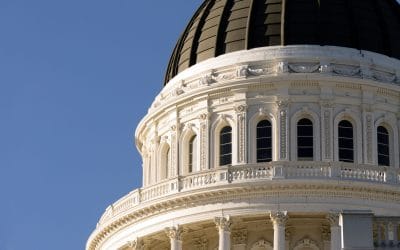Additional Resources for Transitional Kindergarten (TK) Rollout in State Budget
As part of the 2021 Budget Act, Governor Newsom and the Legislature initiated a rollout to make TK available universally to all four-year-old children in California by the 2025-26 school year. Along with the rollout came new requirements for TK programs, including:
- Maintaining an average TK class enrollment of not more than 24 pupils for each schoolsite
- Commencing with the 2022-23 school year, maintaining an average of at least 1 adult for every 12 pupils in TK classrooms (shifts to a 1:10 ratio beginning 2023-24, contingent upon funding)
- Requiring TK teachers first assigned to a TK classroom after July 1, 2015, to demonstrate their qualifications to teach in an early childhood environment by August 1, 2023 – this can be accomplished by meeting one of a suite of qualifications options (24 semester units in early childhood education, for example)
In order to assist LEAs with TK expansion, in addition to increasing (i.e. rebenching) the Prop. 98 guarantee by $614 million to account for increased TK ADA, the 2022 Budget Act contained a few pots of money for things like planning and implementation, facilities, and the newly required staffing ratios. Specifically, the Budget Act included:
- $383 million ongoing LCFF add-on to add one certificated or classified staff to TK classrooms
- Note: because this is ongoing funding, it likely satisfies the funding contingency requirement to shift to a 1:10 staffing ratio beginning in 2023-24
- $300 million one-time for PreK Planning and Implementation Grant Program
- This program was implemented via the 2021 Budget Act so this is a second round of funding
- $100 million one-time General Fund for Preschool, TK, and Full-Day K Facilities Grant Program
- The Budget Act also included intent language to include an additional $550 million in the 2023-24 fiscal year
We know there are challenges – particularly with staffing and facilities – that schools are facing as they rollout Universal TK. However, the Governor is heavily invested in getting Universal TK off the ground. As these myriad challenges become increasingly apparent to policymakers in Sacramento, there will almost certainly be more conversations around how to help local educational agencies (LEAs) successfully implement and make available what amounts to an entirely new grade for four-year-olds in California.
Mandatory Kindergarten, Full-Day Kindergarten Bills Vetoed.
The state’s rollout of Universal TK has continued, but efforts to make kindergarten mandatory in California are seemingly introduced every legislative session, only to fall short of becoming law. In 2021-22, Senator Susan Rubio (D- Baldwin Park) introduced SB 70. The bill would have required, beginning in the 2024-25 school year, all children to have completed at least one year of kindergarten prior to being admitted to the first grade of a public elementary school.
Some interest holders speculated that the state’s recent push to make TK universally available may have opened the door to making kindergarten mandatory, particularly with the Governor’s stated desires to expand access to quality early learning programs in California. To that end, Governor Newsom agreed with the intent of the bill, even acknowledging in his veto message “… The learning that happens during the early years of a child’s life is critical to their long-term success and happiness…”. However, his veto message also included concerns over the cost pressures the bill would impose on the state, saying:
While the author’s intent is laudable, SB 70 is estimated to have Prop. 98 General Fund cost impacts of up to $268 million ongoing, which is not currently accounted for in the state’s fiscal plan. With our state facing lower-than-expected revenues over the first few months of this fiscal year, it is important to remain disciplined when it comes to spending, particularly spending that is ongoing.
Although this session’s effort fell short, it is almost certain that, if recent trends hold, we will see another effort to make kindergarten part of compulsory education in California next year. We may also see a reintroduction of AB 1973, which was authored by Assemblymember Kevin McCarty (D- Sacramento), dealing with full-day kindergarten. As presented to the Governor, AB 1973 would have required, from the 2027–28 school year to the 2029–30 school year, a school district or charter school that has an enrolled unduplicated pupil percentage (UPP) of 50 percent or more, and that provides a kindergarten program, to offer, at each schoolsite that provides the program, at least one class that offers a full-day kindergarten program. It would have then also applied these provisions to all school districts and charter schools regardless of their UPP, beginning with the 2030-31 school year.
Similar to his rationale with SB 70, the Governor cited cost concerns when vetoing AB 1973, saying: “I appreciate the author’s intent and his advocacy for early education, however, this bill will create ongoing and one-time costs in the hundreds of millions of dollars to support school facilities and operational costs.”
Despite the vetoes and continued cost concerns, as mentioned above, look for both of these issues to potentially resurface in legislative and budgetary conversations next year.
The Governor signed the following early childhood bills:
Child Care
- AB 321 (Valladares) – Childcare services: enrollment priority.
As part of the continued reforms to, and expansions of, the state’s childcare systems, this bill adds children with a primary home language other than English to priority enrollment in state preschool and federal or state subsidized general child care programs.
Chapter 903, Statutes of 2022 - AB 2131 (Mullin) – Child daycare facilities.
The California Child Day Care Facilities Act provides for the licensure and regulation of daycare centers by the State Department of Social Services (CDSS). Current regulations require a separate license to be issued for each component of a daycare center. Through prior legislation, the state began the process of implementing a single license for these centers. This bill authorizes the CDSS to, in consultation with the State Department of Education (CDE), implement the creation of the single child care center license through all-county letters or similar written instructions (rather than emergency regulations) until formal regulations for the single license are adopted.
Chapter 910, Statutes of 2022
Early Childhood
- AB 210 (Committee on Budget) – Early childhood: childcare and education.
This bill, the early childhood education omnibus trailer bill, sets the rates and policies for all Budget Act appropriations for early childhood education programs in CDE and CDSS. Specifically, this bill:- Extends 2021-22 Budget Act actions taken during the COVID-19 pandemic to waive family fees for childcare and create hold harmless policies for the 2022-23 fiscal year, including preschool, and allocates $107 million federal funds and $6 million state general fund for these purposes.
- Allocates $172.34 million ongoing general fund, and $314 million ongoing Prop. 98, for increases in rates for the California State Preschool program (CSPP) to provide a 1.8 adjustment factor for three year olds, a 2.4 factor for students with exceptional needs, and 1.1 factor for mental health services.
- Appropriates an additional $250 million one-time to the Inclusive Early Education Expansion Program at CDE, and reduces match requirements for hardship LEAs.
- Adopts changes to include a 10% CSPP set-aside for inclusive education, beginning in 2024. The inclusive preschool set-aside will begin at 5% in the 2022-23.
- Expands eligibility for CSPP to families at the state median income.
The bill took effect immediately upon signature as a bill related to the state budget.
Chapter 62, Statutes of 2022 - AB 2806 (Rubio, Blanca) – Childcare and developmental services: preschool: expulsion and suspension: mental health services: reimbursement rates.
This bill expands the existing prohibition on expelling children from state preschool programs to also prohibit the suspension of children enrolled in state preschool programs, and extends the prohibition on suspension and expulsion of children to include those enrolled in child care programs. The bill includes a specific exemption to these provisions, so that if a child enrolled in one of these programs exhibits “persistent and serious behaviors”, and the program “expeditiously pursues and documents” reasonable steps to maintain the child’s safe participation in the program, the program may then unenroll the child.
Chapter 915, Statutes of 2022 - AB 2827 (Quirk-Silva) – Child daycare facilities.
Current regulations impose various requirements on outdoor activity space for child daycare facilities, including, among others, that there be at least 75 square feet per child of outdoor activity space based on the total licensed capacity. This bill requires the CDSS, on or before January 1, 2024, to revise its regulations to permit children with exceptional needs who are enrolled in separate programs or classrooms from nondisabled children to use outdoor play spaces simultaneously with nondisabled children without first seeking a waiver.
Chapter 916, Statutes of 2022 - AB 2832 (Rivas, Robert) – Whole Child Community Equity.
This bill establishes the End Racial and Economic Inequities in Childcare in California Initiative and further requires CDSS, in consultation with CDE, to develop the Whole Child Equity Framework and Whole Child Community Equity Screening Tool. It further requires the agencies to finalize and present the Framework, Equity Tool and their recommended uses to the Legislature by January 1, 2025. This bill also requires CDSS to convene a stakeholder workgroup to provide recommendations for the development of the Framework and the Equity Tool.
Chapter 699, Statutes of 2022 - SB 1047 (Limón) – Early learning and care.
This bill expands, from 12 months to 24 months, the period of a family’s eligibility after establishing initial eligibility for state preschool and subsidized child care and development programs, and expands priority for eligibility, enrollment, and services to include families who receive benefits from any of the following:- Medi-Cal
- CalFresh
- California Food Assistance Program
- California Special Supplemental Nutrition Program for Women, Infants, and Children
- Federal Food Distribution Program on Indian Reservations
- Head Start
- Early Head Start
- Any other designated means-tested government program, as determined by the department
Chapter 923, Statutes of 2022
- SB 1183 (Grove) – The California State Library: Statewide Imagination Library Program.
This bill establishes the Statewide Imagination Library Program, administered by the State Librarian, to provide age-appropriate books to children age birth through age five who are registered for the program, sent to the child’s home on a monthly basis at no cost to families, through Dolly Parton’s Imagination Library.
Chapter 992, Statutes of 2022
Capitol Advisors Group has produced a set of comprehensive client briefs detailing new education laws that were passed by the Legislature and signed into law by Governor Newsom in 2022. Each brief is organized by subject area and includes an executive summary highlighting major changes we think you should know about. Bills signed by the Governor take effect on January 1, 2023, unless the bill specifically states otherwise.




0 Comments